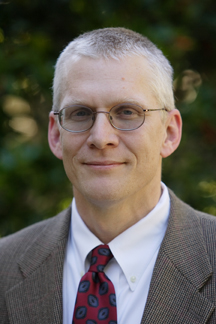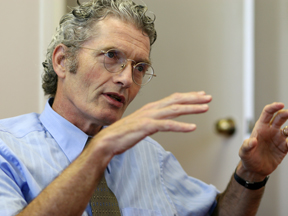Wabash College and the Center of Inquiry in the Liberal Arts at Wabash have received a $394,500 grant from the Teagle Foundation to further the work of the Wabash National Study of Liberal Arts Education.
The Wabash National Study is a longitudinal study investigating critical factors that affect the outcomes of liberal arts education. The study, which began in the fall of 2006, has included 26 colleges and universities to date. The purpose of the Wabash National Study is to provide both the evidence and support necessary to help liberal arts institutions systematically improve student learning.
 "We’ve always seen assessment as an important two-step process that involves both gathering high-quality evidence and using that evidence to promote changes that improve student learning," says Charles Blaich (right), who is the director of inquiries for the Center of Inquiry. "Over the past few years, many institutions have made great strides in the first area as they collect information about student learning from a variety of sources. Unfortunately, this growing assessment movement has hit a critical snag—the inability to move from merely collecting evidence to collecting and using the evidence to make changes that improve student learning. Institutions often find this second step to be the more challenging of the two."
"We’ve always seen assessment as an important two-step process that involves both gathering high-quality evidence and using that evidence to promote changes that improve student learning," says Charles Blaich (right), who is the director of inquiries for the Center of Inquiry. "Over the past few years, many institutions have made great strides in the first area as they collect information about student learning from a variety of sources. Unfortunately, this growing assessment movement has hit a critical snag—the inability to move from merely collecting evidence to collecting and using the evidence to make changes that improve student learning. Institutions often find this second step to be the more challenging of the two."
The grant from the Teagle Foundation will allow the Center of Inquiry to invite 15 additional institutions to participate in a third round of the Wabash National Study, beginning in the fall of 2008, designed specifically to help institutions with the second step in assessment. The Center of Inquiry and the Teagle Foundation will underwrite the costs of administration, scoring, and reporting for all study instruments, and will provide partial support for a number of activities that are designed to help institutions use study data to improve student learning.
"This grant helps us build on the successes and the many lessons learned from the first two years of the Wabash National Study," says Blaich. "The grant from the Teagle Foundation will help us move beyond the hard work of gathering evidence about the impact our institutions have on their students to creating the means by which institutions can use evidence to improve the quality of liberal arts education."
The additional support from the Teagle Foundation marks an important change in the way the Center of Inquiry administers the Wabash National Study and collaborates with participating institutions to use study data. In this next round of the study, the Center has structured activities where institutions will work together and plan to use study data from the very beginning, before data collection even begins. "We hope that these activities will create an increasingly intentional process to support institutions’ learning goals," says Blaich.
"Faculty, staff, and administrators at each institution that starts the study this fall will, in essence, join a four-year collaborative partnership with the Center and with representatives of the other institutions in the study," said Blaich. "The partnership between the Center, the Teagle Foundation, and the 15 institutions is highlighted by the fact that each institution has to commit substantial resources to work with and use the study data to bring about change."
 "The Teagle Foundation’s generous support enables the Center of Inquiry to sustain and expand its longitudinal study of the liberal arts," said Gary A. Phillips (left), Dean of the College at Wabash College and a Center of Inquiry board member. "The grant award is acknowledgment of the importance not only of the assessment of student learning and the Center’s work to help institutions in this area but the need as well to go beyond the gathering of evidence to develop concrete strategies for institutional improvement."
"The Teagle Foundation’s generous support enables the Center of Inquiry to sustain and expand its longitudinal study of the liberal arts," said Gary A. Phillips (left), Dean of the College at Wabash College and a Center of Inquiry board member. "The grant award is acknowledgment of the importance not only of the assessment of student learning and the Center’s work to help institutions in this area but the need as well to go beyond the gathering of evidence to develop concrete strategies for institutional improvement."
"In a quiet, hands-on way, the Center works with colleges across the country to strengthen the liberal arts by strengthening student learning one school, one class, one student at a time. This is the good work that the Teagle Foundation grant underwrites," added Phillips.
Participating institutions will use study data to develop action plans to strengthen the teaching practices and institutional conditions that promote student learning on their campuses. During 2010–2011 institutions will implement their plans, while Center of Inquiry staff and Teagle Scholars provide assistance. By the end of the fourth year, Center staff and Teagle Scholars will review and evaluate the institutional-change programs in light of the data to determine their impact on student learning and identify the qualities that predict growth in student outcomes.
"We’re looking for a substantial commitment from the institutions that will participate in the next round of the Wabash National Study and, in return, we’re making a substantial commitment to these institutions. It truly is a collaborative effort," adds Blaich. "We believe that this commitment and partnership will be beneficial and improve the prospects of the study data having an impact at the institutions."
For more information on the Center of Inquiry in the Liberal Arts and the Wabash National Study of Liberal Arts Education, contact Dr. Blaich at (765) 361-6331, by email, or visit the Center’s website.
 The Teagle Foundation provides leadership for liberal education, marshalling the intellectual and financial resources necessary to ensure that today’s students have access to challenging, wide-ranging, and enriching college education. The Teagle Foundation believes that the benefits of such learning last for a lifetime and are best achieved when colleges develop broad and intellectually stimulating curricula, engage their students in active learning, explore questions of deep social and personal significance, set clear goals, and—crucially—systematically measure progress toward them. The Foundation is committed to disseminating widely the results of its work throughout the higher education community, while understanding that the knowledge generated by its grantees—rather than the funding that enabled their work—is at the heart of its philanthropy.
The Teagle Foundation provides leadership for liberal education, marshalling the intellectual and financial resources necessary to ensure that today’s students have access to challenging, wide-ranging, and enriching college education. The Teagle Foundation believes that the benefits of such learning last for a lifetime and are best achieved when colleges develop broad and intellectually stimulating curricula, engage their students in active learning, explore questions of deep social and personal significance, set clear goals, and—crucially—systematically measure progress toward them. The Foundation is committed to disseminating widely the results of its work throughout the higher education community, while understanding that the knowledge generated by its grantees—rather than the funding that enabled their work—is at the heart of its philanthropy.